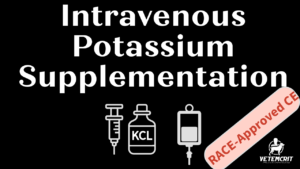| K+ Plasma Concentration (mmol/L) | Rate of K+ Supplementation (mEq/kg/hr) | K+ Recheck Frequency |
|---|---|---|
| 2-2.4 | 0.4-0.5 | Q2-4h |
| 2.5-2.9 | 0.3-0.4 | Q6-8h |
| 3-3.4 | 0.1-0.2 | Q12-24h |
| 3.5-4.5 | 0.05 | Q24h |
| >4.5-5 | Do not supplement |
About the Potassium Calculator
This intravenous potassium calculator is designed to help veterinarians calculate K+ supplementation in mEq/kg/hr (according to Table 1 recommendations) and then translate this value into how much potassium-containing solution you will add to a prespecified volume of IV fluids.
It is not recommended to exceed 0.5 mEq/kg/hr (K max), however there are some exceptions. In hypokalemic human patients and one veterinary case report, potassium infusion rates up to 0.7-0.9 mEq/kg/hr were used safely (Hamill et al. 1991; Allen et al. 2015). Careful mixing of potassium chloride after addition to flexible bags of fluids is extremely important; the rates above >0.5 mEq/kg/hr can be used ONLY in situations of life-threatening symptomatic hypokalemic when you don’t have time to supplement potassium slower or during CPR.
Patients receiving >0.1-0.2 mEq/kg/hr of K+ should have serum K+ monitored every 4-8 hours.
Patients receiving >0.4 mEq/kg/hr of K+ should receive constant ECG monitoring and serum K+ monitoring every 2-4 hours.
Important: Patients with hypokalemia caused by albuterol toxicity may require less potassium supplementation than recommended in Table 1 due to their transient nature of hypokalemia (caused by intracellular potassium shifting).
| Available K+ containing solutions (Additives) | Concentration of K+ per ml | Osmolarity | Recommended minimal dilution for peripheral administration |
|---|---|---|---|
| KCL 20mEq/10 ml | 2 mEq/ml | 4000 mOsm/L | 1:8 to 1:20 |
| KCL 10 mEq/50 ml | 0.2 mEq/ml | 400 mOsm/L | 1:1 to 1:3 |
| KCL 20 mEq/100ml | 0.2 mEq/ml | 400 mOsm/L | 1:1 to 1:3 |
| KCL 40 mEq/100 ml | 0.4 mEq/ml | 800 mOsm/L | 1:3 to 1:5 |
| KCL 4% | 0.53 mEq/ml | 1074 mOsm/L | 1:4 to 1:6 |
| KPhos | 4.4 mEq/ml of K+ and 3 mmol/ml of PO4- | 7400 mOsm/L | 1:20 to 1:40 |
| K2HPO4 (dipotassium phosphate) 174.2 mg/ml | 2 mEq/ml of K+ and 1 mmol/ml of HPO4- | 3000 mOsm/L | 1:5 to 1:10 |

References
1. Allen AE, Buckley GJ, Schaer M. Successful treatment of severe hypokalemia in a dog with acute kidney injury caused by leptospirosis. J Vet Emerg Crit Care (San Antonio). 2016 Nov;26(6):837-843. doi: 10.1111/vec.12416. Epub 2015 Dec 4. PMID: 26636549.
2. Hamill RJ, Robinson LM, Wexler HR, Moote C. Efficacy and safety of potassium infusion therapy in hypokalemic critically ill patients. Crit Care Med. 1991 May;19(5):694-9. doi: 10.1097/00003246-199105000-00016. PMID: 2026032.
3. Guida SJ, Bazzle L. Rebound hyperkalemia in a dog with albuterol toxicosis after cessation of potassium supplementation. J Vet Emerg Crit Care (San Antonio). 2023 Nov-Dec;33(6):715-721. doi: 10.1111/vec.13352. Epub 2023 Nov 9. PMID: 37943086.
Disclaimer
This veterinary calculator is intended for informational and educational purposes only.
The creator of this tool is not responsible for clinical decisions or medical errors resulting from its use.
Users are encouraged to consult with a licensed veterinarian or medical professional to make informed decisions.
